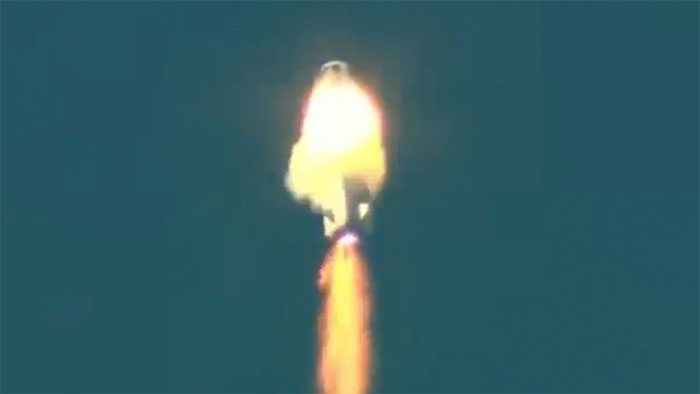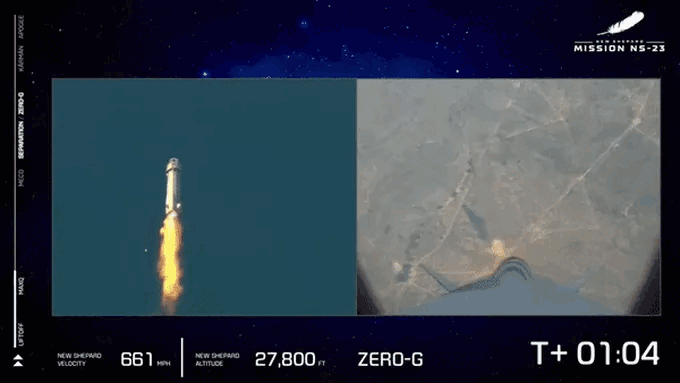Close-up of the New Shepard ship exploding due to an unusual incident
The failure of the New Shepard has reminded us that launching a spacecraft is still not an easy process.
International space carrier Blue Origin has just encountered an unusual problem during a space mission that took place at 10:27 am on September 12 local time (equivalent to 21:27 on September 12 Vietnam time). ).

New Shepard rocket had an unusual problem during launch.
It is known that this is a launch part of the NS-23 mission for the New Shepard spacecraft, taking place in western Texas, USA. There was no crew on the flight. The main mission of the mission is to carry 36 payloads in a short flight to low-Earth orbit space, and then back.
According to Space, the New Shepard's first-stage booster appeared to malfunction about a minute after launch, forcing the ship to activate the automatic emergency exit system.
In the video streamed live by Blue Origin, the New Shepard can be seen suddenly exploding in the air, causing it to immediately separate from the launch system earlier than expected, and fire violently.

The moment the New Shepard capsule turned into a fierce "fireball", soaring into the sky.
Fortunately, the emergency exit system on the capsule ship worked in time, and helped the ship land safely with a speed reducer.
This is considered the first serious incident for the New Shepard spacecraft since the first space flight launched in April 2015.
The occurrence of the incident can be scary for many people, but we need to know that spaceflight always has a certain failure rate. Overall, this is still an extremely complex process, with many high-tech systems that require absolute precision.
Think of NASA's iconic space shuttle program, which has been going on for decades.
As the most famous and largest aviation company in the world, NASA is also not immune to catastrophic failures in its total 135 missions. Two of them killed 14 astronauts.
Most recently, during its Artemis-1 spacecraft launch mission, NASA also recorded a fuel leak that had not even been able to launch the spacecraft from the ground.
Therefore, it is still too early to say that New Shepard's unusual failure will likely have an impact on Blue Origin and the space tourism industry in general in the future.
In fact, since its first launch, the New Shepard has consistently shown stability, and has even carried many tourists to an altitude of about 100 km from Earth, reaching the "edge of space". According to Blue Origin, the New Shepard can be reused up to 21 times.
- Blue Origin released the first images of the world's first travel spacecraft
- Russia announced the cause of the M-12M progressive ship incident
- Blue Origin launched a successful test of space travel ship
- Video: Watch the New Shepard rocket land on Earth
- The 'millennium' Y2K is about to repeat
- Despite the incident, the supply ship still reached ISS
- Close up of the missile journey from the launch pad, move and hit the target
- Modern mysteries
- First shot of the close-up of Comet Hartley 2
- The way the submarine sends a signal for help in distress
- The mysterious cases of tooth exploding in history
- The missile debris launcher landed the moon falling on people's houses
 Van Allen's belt and evidence that the Apollo 11 mission to the Moon was myth
Van Allen's belt and evidence that the Apollo 11 mission to the Moon was myth The levels of civilization in the universe (Kardashev scale)
The levels of civilization in the universe (Kardashev scale) Today Mars, the sun and the Earth are aligned
Today Mars, the sun and the Earth are aligned The Amazon owner announced a secret plan to build a space base for thousands of people
The Amazon owner announced a secret plan to build a space base for thousands of people Video: Watch the New Shepard rocket land on Earth
Video: Watch the New Shepard rocket land on Earth 